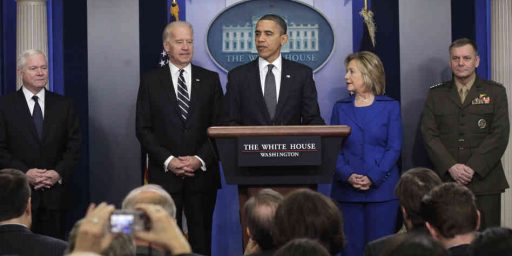SECDEF Condemns ‘Next-War-itis’
Secretary of Defense Robert Gates is working to change a defense culture that looks too much at fighting the next war to justify expensive, cutting-edge systems that may not be justifiable. Or, as the headline writer of Thom Shanker‘s report puts it, “Gates Wants Weapons to Be Useful in Current Conflicts.”
Defense Secretary Robert M. Gates issued a clear warning to the military and its industrial partners on Tuesday that expensive, new conventional weapons must prove their value to current conflicts, marked by insurgency and terrorism, if they hope for a place in future budgets.
In his most direct comments to date on the expected division of labor across the military, Mr. Gates said that the Army and Marine Corps would continue to carry the brunt of the nation’s combat effort. The Air Force and Navy, he said, would be cast as “America’s main strategic deterrent” against potential adversaries such as Iran, North Korea and China.
“I have noticed too much of a tendency towards what might be called ‘Next-War-itis’ — the propensity of much of the defense establishment to be in favor of what might be needed in a future conflict,” Mr. Gates told a conference here sponsored by the Heritage Foundation, a conservative policy institute. “Overall, the kinds of capabilities we will most likely need in the years ahead will often resemble the kinds of capabilities we need today,” he added.
Those comments are certain to alarm advocates of the newest generations of high-tech and high-cost weapons programs, in particular the Army’s Future Combat Systems and the Air Force’s F-22 advanced warplane. Both have come under the scrutiny of Pentagon budget officers questioning whether either would be required for missions similar to the current operations in Iraq or Afghanistan. The Army program, whose total cost could exceed $200 billion, “must continue to demonstrate its value for the types of irregular challenges we will face,” as well as for the full-spectrum of conventional conflict for which it was designed, Mr. Gates said.
The defense secretary also criticized a budget process that he said results in the production of fewer, but more expensive, warships, warplanes and armored vehicles.
This, obviously, is directly counter to his predecessor, Donald Rumsfeld’s, vision. And pretty much the entire history of the Department of Defense.
He’s absolutely right. Unfortunately, unless John McCain wins in November and reappoints him, he’s not going to be able to see this vision through. And, quite possibly, he won’t succeed even under those circumstances, as the military bureaucracy, relevant congressional committees, and defense contractors (the iron triangle which constitutes the “military-industrial complex Dwight Eisenhower warned about) will be four square in opposition.
via Abu Maqawama






Gates is on record as saying he’s out come January no matter who wins. Too bad.
I’m all for buying practical weapons that we can use now, but hopefully this won’t stop R&D and thinking about what might be needed in the future.
Ummm… I thought the big hit on the military (esp. the Army) was that they were always working to re-fight the last war rather than the next one. Did I miss a memo?
More accurately, I think, they’re always preparing to fight the war they’d most like to fight. Which, basically, is a combo WWII/Desert Storm with more expensive toys.
Problem, of course is the ones approving the budgets are only guessing what the next war will be like.
It seems pretty plausible to me that Barack will continue along Bob Gates’ lines. The larger his victory, the more likely it becomes.
Hilary on the other hand, could never have been relied upon to look twice at the military pork.
Glasnost, you’re kidding, right?
I mean, best I can tell the only thing that got cut during the Clinton years was the military… despite being that same military being sent on more missions than under any other President in history.
You got that right, Bithead… I was in the Air Force under Bill Clinton. When he took office the operational tempo seemed to go shoot through the roof while O&M budgets were shrinking. And let’s not mention the freeze on military pay raises that President Clinton attempted for CY1994.
Personally I think Mr. Gates is dreaming with this announcement. Our military might is based in large part on our trying to fight the next war. We never know who our enemies are going to be in the future or what kind of weaponry they have been able to procure.
You raise a good point, blah. And one that makes Gates’ (and Rummy’s) philosophy look rather poor – if we lose the kind of conflict they’re building the military towards (Iraq- & Afghan-style smash-and-hold, with a bit of COIN), we look bad. But if we lose the kind of conflict a ‘heavy’ military is better at (say, China or a resurgently-aggressive Putin-flavored USSR), the US more or less ceases to exist.